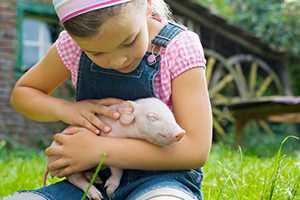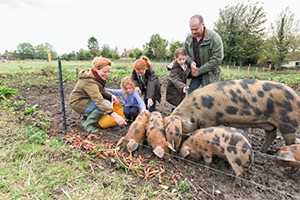Farm Animals
CDC would like to thank Scott Weese, DVM, DVSc, Diplomate of the American College of Veterinary Internal Medicine, for his careful review of these pages.
Interacting with farm animals is an important experience for children and adults.  Being able to touch and watch the animals helps people to learn about agriculture and encourages the human-animal bond.
Being able to touch and watch the animals helps people to learn about agriculture and encourages the human-animal bond.
For many, interacting with live farm animals, including cattle; sheep; pigs; goats; llamas; alpacas; and poultry only happens at petting zoos or on farm visits. For others, working with farm animals has been a lifestyle and tradition. Some people even choose to keep farm animals, including pot-bellied pigs, as pets.
Despite the many benefits of interacting with farm animals, people should be aware that farm animals can carry germs that make people sick.
Diseases that pass from animals to humans are called zoonotic diseases. These diseases can cause a variety of illnesses, from minor skin rashes to serious infections.
By following some simple health tips you and your family are  less likely to get sick from touching, petting, or owning farm animals.
less likely to get sick from touching, petting, or owning farm animals.
Some of the diseases associated with farm animals that can cause human illness are listed here. If you visit a health care provider for any of the symptoms described here, tell the provider that you keep farm animals and have frequent contact with them.
Anthrax (Bacillus anthracis)
Anthrax is a naturally occurring disease of animals caused by a type of bacteria called Bacillus anthracis. People and animals can get anthrax when they accidentally breathe in or swallow spores in contaminated soil, food, or water. The greatest risk is from contact with bodily fluids of an animal that has, or has recently died, from anthrax. Anthrax can also get into open wounds. People who live in areas where anthrax has occurred should consider vaccinating their livestock against the disease.
Anthrax is a serious but rare disease in the United States. The symptoms of anthrax depend on the way someone becomes infected and can take anywhere from 1 day to more than 2 months to appear. All types of anthrax have the potential, if untreated, to spread throughout the body and cause severe illness and even death.
Brucellosis (Brucella abortus, Brucella suis)
Brucellosis is a bacterial disease that affects the ability of animals to reproduce. The disease can be spread to humans through contact with birthing tissues from infected animals or through drinking unpasteurized (raw) milk. Farm animals that are most commonly infected include sheep; cattle; goats; pigs; and dogs, among others. Infected animals may have decreased appetite, weight loss, behavioral changes, and lack of energy, but most animals infected with brucellosis show no signs of illness. Brucellosis can cause early-term deaths in growing fetuses in some animals and occasionally people.
People can get the disease when they are in contact with infected animals or animal products contaminated with the bacteria. One of the most common ways people become infected is through drinking unpasteurized (raw) milk. People who are infected with brucellosis will usually become sick within 6-8 weeks of exposure. Sick people will have flu-like symptoms that last 2-4 weeks. Sometimes brucellosis can become a chronic illness that can be difficult to treat.
Campylobacteriosis (Campylobacter spp.)
Campylobacter is shed in the stool of infected animals. It is spread to people through contaminated food, water, or direct contact with contaminated stool. Many animals, including farm animals, may carry the bacteria without looking sick.
Most people who become sick with campylobacteriosis will have diarrhea, cramping, abdominal pain, and fever within 2-5 days after exposure to the bacteria. Campylobacter can cause serious life-threatening infections in infants, the elderly, and those with weak immune systems.
Contagious ecthyma (also called orf, contagious pustular dermatitis, “sore mouth,” or “scabby mouth”)
Contagious ecthyma is an infectious disease of goats and sheep that is caused by a virus. Goats are often more severely affected than sheep. Infected animals typically have sores that scab over on their skin. Young animals that are infected may get sores on their lips. Sheep and goats may also get sores on their lower legs and udder when infected lambs or kids nurse.
People can become infected after touching an animal’s sores or any piece of equipment, such as a harness, that has touched an infected animal’s sores. People usually get sores on their hands. These sores may be painful and last up to 2 months. They usually heal without scarring.
Cryptosporidiosis (Cryptosporidium spp.)
Cryptosporidium is a parasitic disease that is transmitted through contaminated food or water from an infected human or animal, particularly their contaminated stool. The risk is greatest from contact with young calves, especially calves with diarrhea; however, infected animals may appear healthy or have only mild diarrhea.
In people,Cryptosporidium can cause profuse, watery diarrhea with cramping, abdominal pain, and nausea. Illness in people usually gets better on its own and lasts only 2-4 days. Cryptosporidium can become severe in people with weakened immune systems.
Escherichia coli (E. coli)
Escherichia coli is a type of bacteria that is normally found in the intestinal tracts of healthy farm animals. Most types of E. coli are harmless, but some can cause serious disease in people. E. coli is a common food-borne bacterium, but it can also be transmitted to people by farm animals and their environment. Farm animals including sheep, goats, calves, and backyard poultry affected by E. coli might not show any signs of disease.
Symptoms in people vary but often include severe stomach cramps, diarrhea (often bloody), and vomiting. Although E. coli infection rarely ends in death, blood in the urine is a sign of more severe disease potentially affecting the kidneys.
Influenza (particularly bird and swine influenza)
Influenza is a viral disease that can infect people, pets, and wildlife. Aquatic birds, including ducks, as well as pigs can have influenza virus in their respiratory and intestinal tracts. Birds affected with the influenza virus can appear healthy or only show mild signs of illness (for example, ruffled feathers or decreased egg production). Pigs infected with influenza may be coughing, sneezing, have difficulty breathing, discharge from their nose or eyes, or have no signs of illness at all.
It is rare for bird or swine influenza to spread to people, but occasionally, variants of the virus do infect people. People who work closely with large numbers of birds and pigs, such as poultry or pig producers, are more at risk of infection. People who become sick with variants of bird or swine flu may have fever, chills, cough, sore throat, runny or stuffy nose, and body aches and feel tired. Illness in affected people can range from mild to very severe and life threatening.
Leptospirosis (E. coli spp.)
Leptospirosis is a bacterial disease of humans and animals that is transmitted through contaminated water and urine or other body fluids from an infected animal. The Leptospira spp. bacteria can infect cows, pigs, sheep, goats, horses, and small rodents, and they may not have any signs of illness. Though it is difficult to detect early stages of leptospirosis in animals, the disease can lead to kidney and liver failure if left untreated.
People who become infected with leptospirosis might not have any signs of the disease. Others will have flu-like signs (fever, headache, chills, vomiting, rash) within 2-7 days after exposure. These symptoms usually go away without medical treatment but can reappear and lead to more severe disease (yellow skin and eyes, rash, kidney or liver failure, meningitis).
Listeriosis (Listeria monocytogenes)
Listeria monocytogenes is a type of bacteria that is spread to people and animals through contaminated food, soil, or water. Farm animals that are at risk for Listeria infection include sheep, cattle, goats, and occasionally pigs. Infected animals can have a variety of signs including drooping ears or lips that hang open. Animals sometimes become disoriented and press themselves into corners. Listeria can also cause reproductive problems including abortions and can lead to death of the infected animal.
Listeria is spread to people most commonly through contaminated food. Some people who are affected may not have any signs at all, but the disease can cause headache, stiff neck, confusion, loss of balance, and convulsions in addition to fever and muscle aches. Listeria infections during pregnancy can be life threatening for the fetus.
MRSA (methicillin-resistant Staphylococcus aureus)
Staphylococcus aureus is a type of bacteria that is naturally found on skin and nasal passages of many healthy people and animals. However, it can cause disease in some situations. MRSA is the same bacterium that has become resistant to certain antibiotics, which can make infections harder to treat. MRSA can be passed back and forth between people and farm animals through direct contact.
In humans, MRSA can cause skin infections that may become severe. If left untreated, MRSA can spread to the bloodstream or lungs and cause life-threatening infections.
Q fever (Coxiella )
Coxiella burnetii is a type of bacteria that can cause Q fever in animals and humans. Cattle, sheep, and goats are the animals most commonly affected. C. burnetii is spread through drinking contaminated milk, breathing in dust that is contaminated with C. burnetii, or by coming into contact with contaminated urine, feces, or the birthing tissues of infected animals. Contact with sheep and goats around the time they give birth creates the greatest risk for people to become infected.
People who work closely with farm animals are most at risk. Symptoms of disease usually develop 2-3 weeks after exposure and range from flu-like symptoms to more severe symptoms. In untreated, the infection can lead to pneumonia, liver disease, and heart disease.
Rabies
Rabies is a fatal neurologic disease that can affect many farm animals and people. Animals and people are most commonly infected through bites from rabid animals. Infected animals may have a variety of signs, but most often have a sudden behavioral change and followed by paralysis. Rabies can be prevented in some animals by vaccination.
The first symptoms in people can start days to months after exposure and include weakness, fever, and headache. Within a few days after those first symptoms appear, symptoms will get worse and include confusion, anxiety, unusual behavior, and delirium. If you are bitten by an animal that is acting strange, contact a health care provider right away. Once symptoms appear, it is almost always too late for a person to be treated.
Ringworm (dermatophytosis)
Ringworm is a condition caused by a fungus that can infect skin, hair, and nails of both people and animals. Ringworm is spread from animals to people through direct contact with an infected animal’s skin or hair. Cows, sheep, goats, and pigs can have ringworm on their skin. Affected animals typically have small areas of hair loss around their ears, face or legs with scaly or crusty skin. Some animals carrying ringworm will not have any signs of infection at all.
Ringworm infections in people can appear on almost any area of the body. These infections are usually itchy. Redness, scaling, cracking of the skin, or a ring-shaped rash may occur. If the infection involves the scalp or beard, hair may fall out. Infected nails become discolored or thick and may possibly crumble.
Salmonellosis (Salmonella spp.)
Salmonella is a type of bacteria that spreads to people through contaminated food (eggs and meat) or water or contact with the stool of affected animals, particularly poultry. Salmonella can be found on the bodies of healthy animals when even when they appear healthy and clean. Although it usually doesn’t make farm animals sick, Salmonella can cause serious illness when it is passed to people.
People exposed to Salmonella might have diarrhea, vomiting, fever, or abdominal cramps. Infants, elderly persons, and those with weakened immune systems are more likely than others to develop severe illness.
Tuberculosis (Mycobacterium tuberculosis complex)
Mycobacterium tuberculosis complex is a group of bacteria that cause a disease called tuberculosis. A variety of animals including cattle, goats, and deer can carry tuberculosis bacteria. Infected animals can have a variety of symptoms including weakness, lack of appetite, weight loss, and fever, or they may have a cough that lasts a long time. Some animals might show no symptoms at all.
People are most likely become infected if they consume unpasteurized (raw) milk or milk products (such as cheese) from infected animals. Infections can also happen by consuming undercooked meat, accidentally breathing in the bacteria, or through the skin via cuts or scrapes. Depending on the route of infection, people may have sores, swollen lymph nodes, difficulty breathing, weight loss, night sweats, fever, or intestinal upset.
Vesicular stomatitis
Vesicular stomatitis is caused by a virus that can infect livestock as well as several wildlife animals. The disease in animals usually appears as vesicles, or fluid-filled blisters, around the mouth, under the belly, or on the feet. This disease is typically seen in cattle, horses, and pigs and very rarely in sheep, goats, and llamas.
People may become infected through contact with the skin lesions or secretions from infected animals, especially the fluid from blisters and saliva. Other possible routes of infection include contact with insects that spread the disease. People exposed to the virus may not show any symptoms of disease or they may develop flu-like symptoms or vesicles themselves.
In this section
Healthy habits
Protect yourself, your family, and the animals on the farm by remembering to:
-
Wash your hands with soap and warm running water for at least 20
 seconds after contact with farm animals or after touching items such as fences, buckets, or other equipment used on the farm. Use hand sanitizer if soap and water are not readily available.
seconds after contact with farm animals or after touching items such as fences, buckets, or other equipment used on the farm. Use hand sanitizer if soap and water are not readily available. - Cover any open wounds or cuts when visiting or working around farm animals.
- Avoid bites, scratches, and kicks from farm animals.
- Be cautious when around farm animals. Always be aware of your surroundings and know where animals and escape routes are at all times.
- Do not stand directly behind a farm animal or approach a farm animal from the rear, even when the animal stands in stocks or is restrained.
Tips for staying healthy at petting zoos and animal exhibits
- Do not eat food or drink beverages in animal areas or where animals are allowed to roam. See the Compendium of Measures to Prevent Disease Associated with Animals in Public Settings. [ PDF – 19 pages ]
-
Wash your hands thoroughly with soap and water immediately after touching farm animals or anything in the area where they live and roam. Avoid touching your mouth before washing your hands.
- Adults should supervise hand washing for young children.
- Use hand sanitizer if soap and water are not readily available.
- Wash hands after removing clothes and shoes.
- Supervise children when they are around farm animals:
- Prevent hand-to-mouth activities, such as nail biting, finger sucking, and eating dirt.
- Help children wash hands well with soap after interaction with any farm animal.
- Do not let children 5 years of age or younger handle or touch chicks, ducklings, or live poultry without supervision. See poultry section of Healthy Pets

- Do not allow toys, pacifiers, spill-proof cups, baby bottles, strollers, or similar items to be in animal areas.
Protecting animal health
• If you keep or work with farm animals:
-
- Have dedicated shoes and gloves that you only use when working with your animals. Keep and store these items outside of your home.
- If you visit another farm, be sure to scrub your shoes and change your clothes before interacting with their animals and before coming back to yours.
- Schedule routine veterinary exams and treatments to keep your farm animals healthy and to prevent infectious diseases.
- Make sure any other animals living on the farm, including dogs and cats, receive routine veterinary care.
- Keep farm animals in an enclosed area at night to decrease their exposure to wild animals.
- Use elevated feeders and store feed off the ground. This will help keep pests like mice and rats away.
- Discard spoiled and expired feed.
- Clean farm animal enclosures and stalls frequently; properly dispose of soiled bedding and uneaten food.
What to do if you are bitten, scratched, or kicked by a farm animal
Bites and scratches can become infected, even if the wound does not seem deep or serious.
To prevent infection:
- Wash wounds with soap and warm water immediately.
- Seek medical attention if:
- The animal appears sick or is acting unusual.
- The wound or injury is serious (uncontrolled bleeding, unable to move, extreme pain, muscle or bone is showing, or the bite is over a joint).
- The wound or site of injury becomes red, painful, warm, or swollen. (Especially if the person bitten is 5 years of age or younger, elderly, pregnant, or has a weak immune system.)
- It has been more than 5 years since your last tetanus shot.
Publications and materials
Posters
Wash Hands When Leaving Animal Exhibits [ PDF – 1 page ]
Spanish version [ PDF – 1 page ]
Podcasts
I Love Petting Zoos!
CDC Kidtastics Podcast
Wash Your Hands If You Pet That Bunny
CDC
Things You Can Do to Stay Away from the Flu
CDC Kidtastics Podcast
Got Milk?
CDC
Prion Disease: Learn the Facts. Avoid Exposure
CDC
I Never Get the Flu
CDC Influenza Podcast
Farm animal-associated outbreaks
Crump JA, Sulka AC, Langer AJ, et al. An outbreak of Escherichia coli O157:H7 infections among visitors to a dairy farm.New England Journal of Medicine. 2002; 347:555–560.
Cryptosporidiosis Outbreak at a Summer Camp – North Carolina, 2009. Morbidity and Mortality Weekly Report. 2011 Jul 15; 60(27):918-922.
Rabies in a Dairy Cow, Oklahoma. Rabies [Internet]. CDC [cited Sep 15, 2015].
Orf Virus Infection in Humans – New York, Illinois, California, and Tennessee, 2004-2005. Morbidity and Mortality Weekly Report. 2006 Jan 27; 55(03):65-68.
Q Fever – California. Georgia, Pennsylvania, Tennessee, 2000-2001 Morbidity and Mortality Weekly Report. 2002 Oct 18; 51(41):924-927.
Research articles
McCune S, McCardle PD, Griggin JA, Maholmes V. How animals affect us: examining the influence of human-animal interaction on child development and human health. Washington, DC: American Psychological Association, 2011.
Additional information
Raw (Unpasteurized) Milk
CDC Feature
Compendium of Measures to Prevent Disease Associated with Animals in a Public Setting, 2011. Morbidity and Mortality Weekly Report. 2011 May 6; 60(RR04):1-24.[ PDF – 19 pages ]
Stay Healthy at Animal Exhibits
CDC Feature
- Page last reviewed: October 1, 2015
- Page last updated: October 1, 2015
- Content source:


 ShareCompartir
ShareCompartir